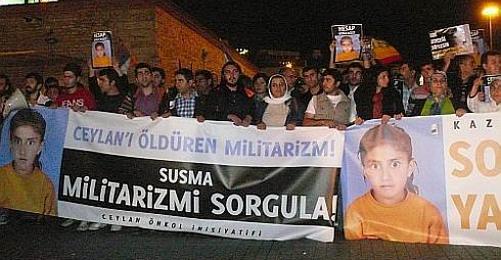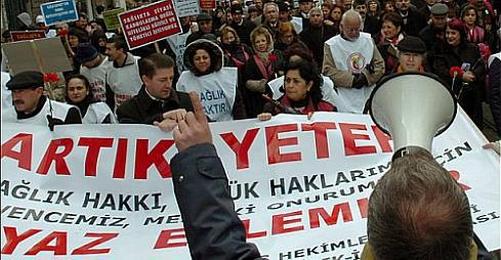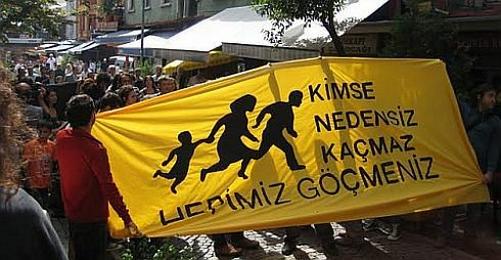The report, released on November 8th, has prompted journalist associations and unions to get to the roots of the problem.
According to Journalists Union of Turkey (TGS) data, the total number of journalists working in the country is 14,400 while only 3,995 -just under 28% of the total- are actually union members.
Yet of the approximately 4,000 union member journalists, say the same figures, only an approximate 500 can actually benefit from union rights such as collective agreements and the right to strike.
Giving information to bianet on the issue, Journalists Association of Turkey (TGC) chair Orhan Erinc,Journalists Union of Turkey (TGS) chair Ercan Ipekci and Contemporary Journalists Association (ÇGD) chair Ahmet Akabay as well as former TGS chair and journalist Sukran Soner reflected a joint belief that the "specific problems" facing journalists aren't necessarily related to law but more to the obstacles in practice.
From the disorder of monopolization to fear of being sacked and the lack of a law protecting rights, many practical problems stand before Turkey's journalists and hinder their right to organizing, say the press activists agreeing with EU views on the issue.
They list the "specific problems" in organizing and collective bargaining in Turkey as the following:
* The disorder created by the monopolization in the media
* The attitude of media owners against unions
* Journalists fearing being laid off
* Failure of laws to protect those who are organizing.
Ipekci: "When media bosses are enemies of unions"
TGS chair Ipekci who said the reference to journalists' union rights in the Progress Report was due to his union's contributions, noted the attitude of newspaper owners who are against unions and explained that this prevented journalists from organizing in unions.
"According to the Constitution, union membership is not a direct reason for dismissal from work and even if newspaper owners do not use this as an excuse, they do dismiss journalists from work creating various other excuses" Ipekci said.
He added that the media bosses' lack of respect to union rights also prevented the social dialogue criteria that the EU sought for progress.
Noting that EU's Olli Rehn in charge of expansion had himself stressed that there was no progress on union rights in Turkey, Ipekci added, "Even though the government says 'we are progressing', on the issue of union rights it is kicking the ball out of the touch line. Instead of using an initiative to enforce the conditions that the EU has put forth on this issue, it maintains the mentality that the employer and the employee should agree between themselves, even though it knows this is not possible".
According to Ipekci, only a third of all working journalists are organized in Turkey and only one in eight of those who are organized can actually use union rights such as collective agreements and the right to strike.
He said these journalists were actually those who worked for the state agency Anatolian Agency (AA) and employees of the Ankara News Agency (ANKA).
Ipekci explained that the statistics at the Union showed approximately 3,500 union member journalists are not able to benefit from their union rights. He said that while there was fear of being dismissed on part of journalists, this was not the only reason behind the picture either.
"While defending the rights of everyone else", Ipekci said, "when it comes to their own rights they can well be indifferent".
Erinc: Laws do not protect organized journalists
According to TGC Chairman Erinc, even though the laws do not say "don't organize" to journalists, they do not effectively protect the journalists who want to organize.
Erinc believes one of the "specific problems" is that journalists are intimidated now on acting on this issue because of the previous pressures against organizing in unions.
"Although in instances of dismissal some additional forms of compensation are foreseen due to unions in Turkey, there are no sanctions that prevent someone being made unemployed" he says, noting that the obstruction before them is a physical one and that the term used in the Progress Report referred to such situation.
Soner: Media sector is in disorder
TGS former chairman Soner agrees that "in any case, the existing general picture with regard to unions is not encouraging".
"Union rights have lost a lot of blood during 12 September [military coup] and globalization eras".
Soner said that the total number of union member workers in Turkey was around 750,000 that, inclusive of the private and privatized public sectors that were shrinking could only be described as "a collapse".
Noting that monopolization was a considerable threat throughout the world, Soner said that in Turkey this monopolization did not even take place according to a convention and that journalists were not organized as result of this disorder brought on with monopolization.
According to Soner, the media sector is a field where monopolization and disorder is observed more than anywhere else and as a sector, it is as much in disorder and out of the laws as the construction sector.
Soner listed the lack of order in the media sector as:
* One-year contracts in the media allows for those working between companies to be undermined.
* Journalists, on paper, are shown not as employees of the newspaper they work for but as if they are employed by another company. There are television staff working for construction companies.
* Employment by copyright leads to serious problems. Even the most important journalists are made to work by copyright.
* Columnists and managers who are working for the highest salaries receive their income through more than one company even though this is not reflective of their real employment.
* Trainees or apprentice journalists are being made to work for a long time with no social security. If a contract is made, there is no press contract. There is no seniority [pay] law. The work time of those made to work is ambiguous.
"Union data isn't realistic"
Journalist Soner does not believe the data showing there are 3,995 union member journalists in Turkey is realistic. In his view, the number of real union members actively in journalism is lower.
Saying that since 1980 a number of journalists who retired and died were not deleted from the records, Soner believes one reason for maintaining the figure is to keep the number of union members high in order to show that a system actually exists.
Soner notes that other than journalists working for the television sector and newspapers, media workers do not actually enjoy a definition that shows their branch of profession.
"A symbolic radio [station] wanted to register with the union for idealistic reasons" he cites as an example. "They could not formulate how to do this." In Soner's words, the problem is that the profession is not described clearly which leads to debate on whether it is entertainment, magazine or others.
Another issue, he points out, is one of journalists being made to sign a blank paper when they are employed. "What kind of confidence would a journalist have in joining a union where there is a piece of blank paper he's been made to sign when given employment?" he asks.
Soner is a journalist who believes the expressions used in the EU text with regard to union rights in Turkey are insufficient.
"These rights are never brought to the agenda in the bargaining on the Copenhagen criteria" he argues. "This is because they put them in just so its not impolite. There is no monitoring. I do not think any serious sanction will be imposed from Europe. I say these based on the debate. No steps have been taken in the name of rights".
Abakay: Monopolization threatens organization and independence
CGD chairman Abakay says "There are no legal obstructions in front of union rights such as collective agreements or the right to strike. There are practical obstructions".
In his view, monopolization is the actual obstruction in Turkey because with it, comes the psychological threat of lay-offs. Abakay says that just like in the case of unions, monopolization also threatens editorial independence.
"If journalists cannot organize, if they cannot claim up to the existing organizations, call it pressure or monopolization, the responsibility for this is with the unions and journalists" he says.
Accepting that 1980 and the post-military coup era delivered a serious blow to organizations and unions, Abakay said this did not mean an excuse not to organize.
"If no one says you can't become a meber of the TGS, if no one says TGS cannot organize in this workplace, that means the issue is the unsuccessfulness of unions and journalists" he says, adding, this situation could not be used as an excuse for surrendering in front of an employer.
"There is a distancing in Turkey, in general, to all forms of organizing" Abakay believes. "Mass unions are also dysfunctional. Previously the TGS was organized in every newspaper. The September 12 law is in force but the Public Workers Unons Confederation (KESK) is as influential as no union has been. While there are no collective agreement rights, it holds these in its hands. The law is not the reason unions are losing people. (EZO/KO/II/EU)











